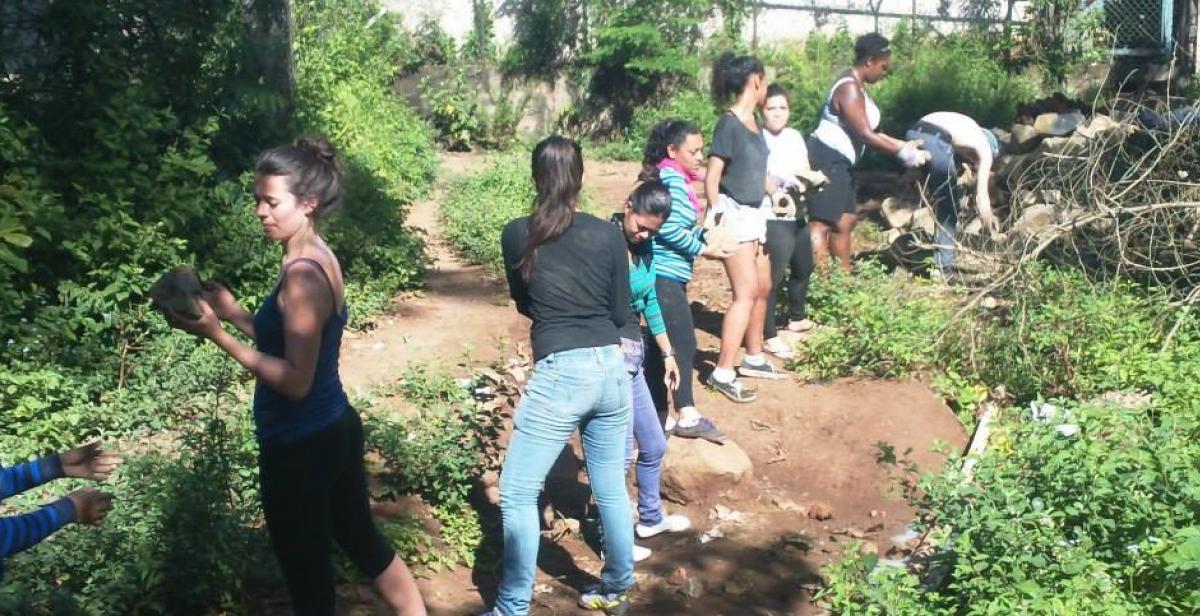Nicola Smith has been volunteering with ICS in Nuevo Gualcho, Usulután department, in El Salvador since April. Throughout her time, she encountered a lot of strong and inspirational women of all ages. This is Nicola’s blog about one of those women, Roselia Hererra Amaya.
One of the most inspiring women I’ve met is my host mother, Roselia Hererra Amaya. Roselia has spent the majority of her life campaigning and working to improve the rights of rural women in her own community and across El Salvador. To celebrate the International Day of Rural Women, I spoke with Roselia to learn more about the situation of rural women in El Salvador and how she is fighting to change things.
Following the damaging 12 year long civil war, rural women experienced a lot of marginalisation. The war began because many campesinos – rural farmers who work the land for maize, beans and other agricultural crops – began to fight for their rights. Previously, the rural workers did not receive proper payment for their work and their rights were limited. People began to question the regime and this lead to the armed struggle, which lasted from 1980 until 1992.
Women played a very important role throughout the civil war. I have met various women who contributed to the guerrilla effort. Many women worked in hospitals set up in camps, and made the most of what they had to treat and care for the injured. Many cooked food for the guerrillas and some made clothing, hammocks and other vital supplies.
Rural women are still disadvantaged and their rights and opportunities remained limited in key areas such as health, education and work. Since her return to El Salvador from the refugee camps in Honduras, Roselia has been involved at a community and national level to change the situation of rural women. She is a member of the local women’s organisation in Nuevo Gulacho, along with the majority of women in the community. They work with the support of Movimiento Salvadoreño de Mujeres to provide training, assistance and a forum for change.
Roselia is also the President of the National Board of Rural Women, an organisation consisting of 53 associations and 35 women who participate in regular meetings and campaign for greater rights for rural women in El Salvador. These include the right to increased salaries, improved housing and access to their own land.
These organisations, and many more like them across the country, face difficulties in the fight to improve the lives of rural women. These include limited resources and funding to implement activities and a lack of physical spaces for women to meet, share ideas and initiate change. However, since the change of government in 2009, rural women and organisations have received increased state support.
Roselia believes there is now better attention to the needs of rural communities. More social programmes are available to help rural women and their families, and there is hope for further economic policies and social changes to improve their lives.
The situation for rural women in El Salvador has improved and is continuing to improve. Roselia told me women only gained the right to vote 64 years ago. Although Roselia believes there is still some way to go until equality is achieved between women and men, women today are able to join together to raise awareness and make decisions about the issues that matter to them. They have experienced improvements in these areas thanks to their campaigning.
In Roselia’s opinion these changes have occurred because the Salvadorian women have fought for them. This quality – the fighting Salvadorian spirit – is what has touched me most about all of the Salvadorian men and women, both old and young, and is what will stay with me following this experience.
I believe women like Roselia are the backbone of their communities and I am sure there are many more examples like her across the country. It is these women who will continue to demand change for their communities, for their families and for themselves - changes which will benefit their daughters and granddaughters for generations to come.



